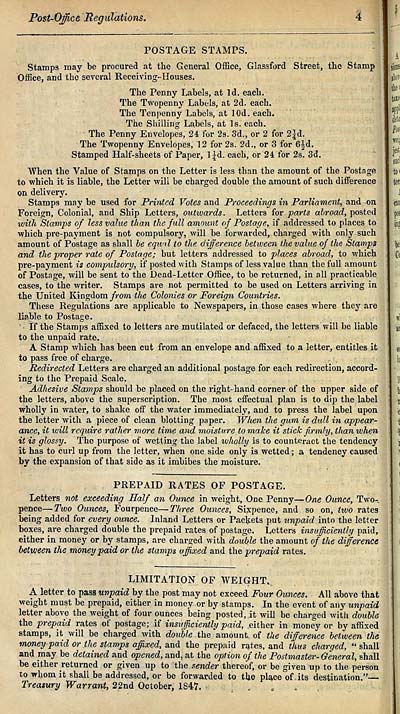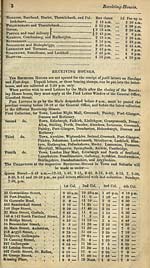Download files
Complete book:
Individual page:
Thumbnail gallery: Grid view | List view

Post-Office Regulations.
POSTAGE STAMPS.
Stamps may be procured at the General Office, Glassford Street, the Stamp
Office, and the several Receiving-Houses.
The Penny Labels, at Id. each.
The Twopenny Labels, at 2d. each.
The Tenpenny Labels, at lOd. each.
The Shilling Labels, at Is. each.
The Penny Envelopes, 24 for 2s. 3d., or 2 for 2|d.
The Twopenny Envelopes, 12 for 2s. 2d., or 3 for 6^d.
Stamped Half-sheets of Paper, 1 Jd. each, or 24 for 2s. 3d.
When the Value of Stamps on the Letter is less than the amount of the Postage
to which it is liable, the Letter wili be charged double the amount of such difference
on delivery.
Stamps may be used for Printed Votes and Proceedings in Parliament, and on
Foreign, Colonial, and Ship Letters, oulivards. Letters for parts abroad, posted
with Stamps of less value than the full amount of Postage, if addressed to places to
which pre-payment is not compulsory, will be forwarded, charged with only such
amount of Postage as shall be equal to the difference between the value of the Stamps
and the proper rate of Postage; but letters addressed to places abroad, to which
pre-payment is compulsory, if posted with Stamps of less value than the full amount
of Postage, will be sent to the Dead-Letter Office, to be returned, in all practicable
cases, to the writer. Stamps are not permitted to be used on Letters arriving in
the United Kingdom from the Colonies or Foreign Countries.
These Regulations are applicable to Newspapers, in those cases where they are
liable to Postage.
' ■ If the Stamps affixed to letters are mutilated or defaced, the letters will be liable
to the unpaid rate.
A Stamp which has been cut from an envelope and affixed to a letter, entitles it
to pass free of charge.
Redirected Letters are charged an additional postage for each redirection, accord-
ing to the Prepaid Scale.
Adhesive Stamps should be placed on the right-hand corner of the upper side of
the letters, above the superscription. The most effectual plan is to dip the label
wholly in water, to shake off the water immediately, and to press the label upon
the letter with a piece of clean blotting paper. When the gum is dull in appear-
ance, it will require rather more time and moisture to make it stick firmly, than when
it is glossy. The purpose of wetting the label wholly is to counteract the tendency
it has to curl up from the letter, when one side only is wetted ; a tendency caused
by the expansion of that side as it imbibes the moisture.
PREPAID RATES OF POSTAGE.
Letters not exceeding Half an Ounce in weight, One Penny — One Ounce, Two-
pence — Two Ounces, Fourpence — Three Ounces, Sixpence, and so on, two rates
being added for every ounce. Inland Letters or Packets put unpaid into the letter
boxes, are charged double the prepaid rates of postage. Letters insufficiently paid,
either in money or by stamps, are charged with double the amount of the difference
between the money paid or the stamps affixed and the prepaid rates.
LIMITATION OF WEIGHT.
A letter to pass unpaid by the post may not exceed Four Ounces. All above that
weight must be prepaid, either in money or by stamps. In the event of any unpaid
letter above the weight of four ounces being posted, it will be charged witli double
the prepaid rates of postage; if insufficiently paid, either in money or by affixed
stamps, it will be charged with double the amount of the difference between the
money paid or the stamps affixed, and the prepaid rates, and thus charged, " shall
and may be detained and opened, and, at the option of the Postmaster- General, shall
be either returned or given up to the sender thereof, or be given up to the person
to whom it shall be addressed, or be forwarded to the place of its destination." —
Treasury Warrant, 22nd October, 1847.
POSTAGE STAMPS.
Stamps may be procured at the General Office, Glassford Street, the Stamp
Office, and the several Receiving-Houses.
The Penny Labels, at Id. each.
The Twopenny Labels, at 2d. each.
The Tenpenny Labels, at lOd. each.
The Shilling Labels, at Is. each.
The Penny Envelopes, 24 for 2s. 3d., or 2 for 2|d.
The Twopenny Envelopes, 12 for 2s. 2d., or 3 for 6^d.
Stamped Half-sheets of Paper, 1 Jd. each, or 24 for 2s. 3d.
When the Value of Stamps on the Letter is less than the amount of the Postage
to which it is liable, the Letter wili be charged double the amount of such difference
on delivery.
Stamps may be used for Printed Votes and Proceedings in Parliament, and on
Foreign, Colonial, and Ship Letters, oulivards. Letters for parts abroad, posted
with Stamps of less value than the full amount of Postage, if addressed to places to
which pre-payment is not compulsory, will be forwarded, charged with only such
amount of Postage as shall be equal to the difference between the value of the Stamps
and the proper rate of Postage; but letters addressed to places abroad, to which
pre-payment is compulsory, if posted with Stamps of less value than the full amount
of Postage, will be sent to the Dead-Letter Office, to be returned, in all practicable
cases, to the writer. Stamps are not permitted to be used on Letters arriving in
the United Kingdom from the Colonies or Foreign Countries.
These Regulations are applicable to Newspapers, in those cases where they are
liable to Postage.
' ■ If the Stamps affixed to letters are mutilated or defaced, the letters will be liable
to the unpaid rate.
A Stamp which has been cut from an envelope and affixed to a letter, entitles it
to pass free of charge.
Redirected Letters are charged an additional postage for each redirection, accord-
ing to the Prepaid Scale.
Adhesive Stamps should be placed on the right-hand corner of the upper side of
the letters, above the superscription. The most effectual plan is to dip the label
wholly in water, to shake off the water immediately, and to press the label upon
the letter with a piece of clean blotting paper. When the gum is dull in appear-
ance, it will require rather more time and moisture to make it stick firmly, than when
it is glossy. The purpose of wetting the label wholly is to counteract the tendency
it has to curl up from the letter, when one side only is wetted ; a tendency caused
by the expansion of that side as it imbibes the moisture.
PREPAID RATES OF POSTAGE.
Letters not exceeding Half an Ounce in weight, One Penny — One Ounce, Two-
pence — Two Ounces, Fourpence — Three Ounces, Sixpence, and so on, two rates
being added for every ounce. Inland Letters or Packets put unpaid into the letter
boxes, are charged double the prepaid rates of postage. Letters insufficiently paid,
either in money or by stamps, are charged with double the amount of the difference
between the money paid or the stamps affixed and the prepaid rates.
LIMITATION OF WEIGHT.
A letter to pass unpaid by the post may not exceed Four Ounces. All above that
weight must be prepaid, either in money or by stamps. In the event of any unpaid
letter above the weight of four ounces being posted, it will be charged witli double
the prepaid rates of postage; if insufficiently paid, either in money or by affixed
stamps, it will be charged with double the amount of the difference between the
money paid or the stamps affixed, and the prepaid rates, and thus charged, " shall
and may be detained and opened, and, at the option of the Postmaster- General, shall
be either returned or given up to the sender thereof, or be given up to the person
to whom it shall be addressed, or be forwarded to the place of its destination." —
Treasury Warrant, 22nd October, 1847.
Set display mode to: Large image | Transcription
Images and transcriptions on this page, including medium image downloads, may be used under the Creative Commons Attribution 4.0 International Licence unless otherwise stated. ![]()
| Scottish Post Office Directories > Towns > Glasgow > Post-Office annual Glasgow directory > 1849-1850 > (448) |
|---|
| Permanent URL | https://digital.nls.uk/83866181 |
|---|
| Description | Directories of individual Scottish towns and their suburbs. |
|---|
| Description | Around 700 Scottish directories published annually by the Post Office or private publishers between 1773 and 1911. Most of Scotland covered, with a focus on Edinburgh, Glasgow, Dundee and Aberdeen. Most volumes include a general directory (A-Z by surname), street directory (A-Z by street) and trade directory (A-Z by trade). |
|---|


